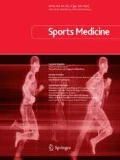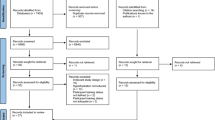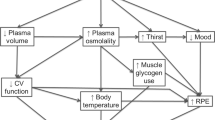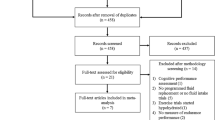Abstract
Background
Progressive exercise-induced dehydration may impair aerobic exercise performance (AEP). However, no systematic approach has yet been used to determine how pre-exercise hypohydration, which imposes physiological challenges differing from those of a well-hydrated pre-exercise state, affects AEP and related components such as peak oxygen consumption \((\dot{V}{\text{O}}_{{2{\text{peak}}}} )\) and \(\dot{V}{\text{O}}_{2}\) at lactate threshold \((\dot{V}{\text{O}}_{2} {\text{LT}})\).
Objective
To determine, using a systematic approach with meta-analysis, the magnitude of the effect of pre-exercise hypohydration on AEP, \(\dot{V}{\text{O}}_{{2{\text{peak}}}}\) and \(\dot{V}{\text{O}}_{2} {\text{LT}}\).
Design
This was a systematic review with meta-analysis of well-controlled studies.
Data Sources
MEDLINE, SPORTDiscus and CINAHL databases and cross-referencing.
Inclusion Criteria for Selecting Studies
(1) well-controlled human (≥ 18 years) studies; (2) pre-exercise hypohydration induced at least 1 h prior to exercise onset; (3) pre-exercise body mass loss in the hypohydrated, experimental condition was ≥ 1% and ≥ 0.5% than the well-hydrated, control condition; (4) following the dehydrating protocol body mass change in the control condition was within − 1% to + 0.5% of the well-hydrated body mass.
Results
A total of 15 manuscripts were included, among which 14, 6 and 6 met the inclusion criteria for AEP, \(\dot{V}{\text{O}}_{{2{\text{peak}}}}\) and \(\dot{V}{\text{O}}_{2} {\text{LT}}\), respectively, providing 21, 10 and 9 effect estimates, representing 186 subjects. Mean body mass decrease was 3.6 ± 1.0% (range 1.7–5.6%). Mean AEP test time among studies was 22.3 ± 13.5 min (range 4.5–54.4 min). Pre-exercise hypohydration impaired AEP by 2.4 ± 0.8% (95% CI 0.8–4.0%), relative to the control condition. Peak oxygen consumption and \(\dot{V}{\text{O}}_{2} {\text{LT}}\), respectively, decreased by 2.4 ± 0.8% (95% CI 0.7–4.0%) and 4.4 ± 1.4% (95% CI 1.7–7.1%), relative to the control condition. Compared with starting an exercise hypohydrated, it is respectively likely, possible and likely that AEP, \(\dot{V}{\text{O}}_{{2{\text{peak}}}}\) and \(\dot{V}{\text{O}}_{2} {\text{LT}}\) benefit from a euhydrated state prior to exercise. Meta-regression analyses did not establish any significant relationship between differences in body mass loss and differences in the percent change in AEP or \(\dot{V}{\text{O}}_{2} {\text{LT}}\). However, \(\dot{V}{\text{O}}_{{2{\text{peak}}}}\) was found to decrease by 2.6 ± 0.8 % (95% CI 0.7–4.5%) for each percent loss in body mass above a body mass loss threshold of 2.8%.
Conclusion
Pre-exercise hypohydration likely impairs AEP and likely reduces \(\dot{V}{\text{O}}_{2} {\text{LT}}\) (i.e., the aerobic contribution to exercise was lower) during running and cycling exercises ≤ 1 h across different environmental conditions (i.e., from 19 to 40 °C). Moreover, pre-exercise hypohydration possibly impedes \(\dot{V}{\text{O}}_{{2{\text{peak}}}}\) during such exercises.







Similar content being viewed by others
Data Availability Statement
The data will be made available from the corresponding author upon reasonable request. Data used to conduct this meta-analysis can be found within each individual study included in this meta-analysis.
References
Joyner MJ, Coyle EF. Endurance exercise performance: the physiology of champions. J Physiol. 2008;586(1):35–44.
Cheuvront SN, Kenefick RW, Montain SJ, Sawka MN. Mechanisms of aerobic performance impairment with heat stress and dehydration. J Appl Physiol. 2010;109(6):1989–95.
Nybo L, Jensen T, Nielsen B, González-Alonso J. Effects of marked hyperthermia with and without dehydration on VO2 kinetics during intense exercise. J Appl Physiol. 2001;90(3):1057–64.
Nadel ER, Fortney SM, Wenger CB. Effect of hydration state of circulatory and thermal regulations. J Appl Physiol. 1980;49(4):715–21.
Fortney S, Nadel E, Wenger C, Bove J. Effect of acute alterations of blood volume on circulatory performance in humans. J Appl Physiol. 1981;50(2):292–8.
Fortney S, Nadel E, Wenger C, Bove J. Effect of blood volume on sweating rate and body fluids in exercising humans. J Appl Physiol. 1981;51(6):1594–600.
Gonzalez-Alonso J, Mora-Rodríguez R, Coyle EF. Stroke volume during exercise: interaction of environment and hydration. Am J Physiol Heart Circ Physiol. 2000;278(2):H321–30.
Wingo JE, Ganio MS, Cureton KJ. Cardiovascular drift during heat stress: implications for exercise prescription. Exerc Sport Sci Rev. 2012;40(2):88–94.
Wingo JE, LaFrenz AJ, Ganio MS, Edwards GL, Cureton KJ. Cardiovascular drift is related to reduced maximal oxygen uptake during heat stress. Med Sci Sports Exerc. 2005;37(2):248–55.
Ganio MS, Wingo JE, Carroll CE, Thomas MK, Cureton K. Fluid ingestion attenuates the decline in VO2peak associated with cardiovascular drift. Med Sci Sports Exerc. 2006;38(5):901–9.
Caldwell J, Ahonen E, Nousiainen U. Differential effects of sauna-, diuretic-, and exercise-induced hypohydration. J Appl Physiol. 1984;57(4):1018–23.
Fernandez-Elias VE, Hamouti N, Ortega JF, Mora-Rodriguez R. Hyperthermia, but not muscle water deficit, increases glycogen use during intense exercise. Scand J Med Sci Sports. 2015;25(Suppl 1):126–34.
Hargreaves M, Dillo P, Angus D, Febbraio M. Effect of fluid ingestion on muscle metabolism during prolonged exercise. J Appl Physiol. 1996;80(1):363–6.
González-Alonso J, Calbet JA, Nielsen B. Metabolic and thermodynamic responses to dehydration-induced reductions in muscle blood flow in exercising humans. J Physiol. 1999;520(2):577–89.
Logan-Sprenger HM, Heigenhauser GJ, Jones GL, Spriet LL. The effect of dehydration on muscle metabolism and time trial performance during prolonged cycling in males. Physiol Rep. 2015;3(8):e12483.
Kenefick RW, Mahood NV, Mattern CO, Kertzer R, Quinn TJ. Hypohydration adversely affects lactate threshold in endurance athletes. J Strength Cond Res. 2002;16(1):38–43.
Bassett DR, Howley ET. Limiting factors for maximum oxygen uptake and determinants of endurance performance. Med Sci Sports Exerc. 2000;32(1):70–84.
Sawka MN, Burke LM, Eichner ER, Maughan RJ, Montain SJ, Stachenfeld NS. American College of Sports Medicine position stand. Exercise and fluid replacement. Med Sci Sports Exerc. 2007;39(2):377–90.
McDermott BP, Anderson SA, Armstrong LE, Casa DJ, Cheuvront SN, Cooper L, et al. National Athletic Trainers’ Association position statement: fluid replacement for the physically active. J Athl Train. 2017;52(9):877–95.
Holland J, Skinner T, Irwin C, Leveritt M, Goulet E. The influence of drinking fluid on endurance cycling performance: a meta-analysis. Sports Med. 2017;47(11):2269–84.
Goulet EDB, Hoffman MD. Impact of ad libitum versus programmed drinking on endurance performance: a systematic review with meta-analysis. Sports Med. 2019;49(2):221–32.
Magee PJ, Gallagher AM, McCormack JM. High prevalence of dehydration and inadequate nutritional knowledge among university and club level athletes. Int J Sport Nutr Exerc Metab. 2017;27(2):158–68.
Volpe SL, Poule KA, Bland EG. Estimation of prepractice hydration status of National Collegiate Athletic Association Division I athletes. J Athl Train. 2009;44(6):624–9.
Oliver SJ, Laing SJ, Wilson S, Bilzon JL, Walsh N. Endurance running performance after 48 h of restricted fluid and/or energy intake. Med Sci Sports Exerc. 2007;39(2):316–22.
Kenefick RW, Cheuvront SN, Palombo LJ, Ely BR, Sawka MN. Skin temperature modifies the impact of hypohydration on aerobic performance. J Appl Physiol. 2010;109(1):79–86.
Castellani JW, Muza SR, Cheuvront SN, Sils IV, Fulco CS, Kenefick RW, et al. Effect of hypohydration and altitude exposure on aerobic exercise performance and acute mountain sickness. J Appl Physiol. 2010;109(6):1792–800.
Papadopoulos C, Doyle J, Rupp J, Brandon L, Benardot D, Thompson W. The effect of the hypohydration on the lactate threshold in a hot and humid environment. J Sport Med Phys Fit. 2008;48(3):293–9.
Adams J, Sekiguchi Y, Suh H-G, Seal AD, Sprong CA, Kirkland TW, et al. Dehydration impairs cycling performance, independently of thirst: a blinded study. Med Sci Sports Exerc. 2018;50(8):1697–703.
Bardis CN, Kavouras SA, Arnaoutis G, Panagiotakos DB, Sidossis LS. Mild dehydration and cycling performance during 5-kilometer hill climbing. J Athl Train. 2013;48(6):741–7.
Bardis CN, Kavouras SA, Kosti L, Markousi M, Sidossis LS. Mild hypohydration decreases cycling performance in the heat. Med Sci Sports Exerc. 2013;45(9):1782–9.
Ahn E, Kang H. Introduction to systematic review and meta-analysis. Korean J Anesthesiol. 2018;71(2):103–12.
Sawka MN, Cheuvront SN, Kenefick RW. Hypohydration and human performance: impact of environment and physiological mechanisms. Sports Med. 2015;45(1):51–60.
Cheuvront SN, Kenefick RW. Dehydration: physiology, assessment, and performance effects. Compr Physiol. 2014;4(1):257–85.
Juni P, Witschi A, Bloch R, Egger M. The hazards of scoring the quality of clinical trials for meta-analysis. JAMA. 1999;282(11):1054–60.
Cheuvront SN, Carter R, Castellani JW, Sawka MN. Hypohydration impairs endurance exercise performance in temperate but not cold air. J Appl Physiol. 2005;99(5):1972–6.
England P, Powers SK, Dodd S, Callender T, Brooks E. The effect of acute thermal dehydration on blood lactate accumulation during incremental exercise. J Sports Sci. 1984;2(2):105–11.
Kozlowski S. Physical performance and maximum oxygen uptake in man in exercise dehydration. Bull Acad Pol Sci Biol. 1966;14(7):513–9.
Stewart CJ, Whyte DG, Cannon J, Wickham J, Marino FE. Exercise-induced dehydration does not alter time trial or neuromuscular performance. Int J Sports Med. 2014;35(9):725–30.
Zoladz J, Szkutnik Z, Majerczak J, Duda K, Pedersen PK. Non-linear relationship between oxygen uptake and power output in the Astrand nomogram-old data revisited. J Physiol Pharmacol. 2007;58(2):265.
Casa DJ, Stearns RL, Lopez RM, Ganio MS, McDermott BP, Walker Yeargin S, et al. Influence of hydration on physiological function and performance during trail running in the heat. J Athl Train. 2010;45(2):147–56.
Tanaka H, Monahan KD, Seals DR. Age-predicted maximal heart rate revisited. J Am Coll Cardiol. 2001;37(1):153–6.
Londeree B, Thomas T, Ziogas G, Smith T, Zhang Q. % VO2max versus% HRmax regressions for six modes of exercise. Med Sci Sports Exerc. 1995;27(3):458–61.
Webster S, Rutt R, Weltman A. Physiological effects of a weight loss regimen practiced by college wrestlers. Med Sci Sports Exerc. 1990;22(2):229–34.
Dengel DR, Weyand PG, Black DM, Cureton KJ. Effect of varying levels of hypohydration on responses during submaximal cycling. Med Sci Sports Exerc. 1992;24(10):1096–101.
Maughan RJ, Shirreffs SM, Leiper JB. Errors in the estimation of hydration status from changes in body mass. J Sports Sci. 2007;25(7):797–804.
Montain SJ, Cheuvront SN. Fluid, electrolyte and carbohydrate requirements for exercise. In: Taylor NAS, Groeller H, editors. Physiological bases of human performance during work and exercise. Philadelphia: Elsevier Limited; 2008.
Merry TL, Ainslie PN, Cotter JD. Effects of aerobic fitness on hypohydration-induced physiological strain and exercise impairment. Acta Physiol. 2010;198(2):179–90.
Savoie FA, Kenefick RW, Ely BR, Cheuvront SN, Goulet ED. Effect of hypohydration on muscle endurance, strength, anaerobic power and capacity and vertical jumping ability: a meta-analysis. Sports Med. 2015;45(8):1207–27.
Goulet ED. Effect of exercise-induced dehydration on endurance performance: evaluating the impact of exercise protocols on outcomes using a meta-analytic procedure. Br J Sports Med. 2013;47(11):679–86.
Hopkins WG, Schabort EJ, Hawley JA. Reliability of power in physical performance tests. Sports Medicine. 2001;31(3):211–34.
Hopkins WG. How to interpret changes in an athletic performance test. J Sports Sci. 2004;8:1–7.
Hawley JA, Noakes TD. Peak power output predicts maximal oxygen uptake and performance time in trained cyclists. Eur J Appl Physiol Occup Physiol. 1992;65(1):79–83.
Saltin B. Aerobic and anaerobic work capacity after dehydration. J Appl Physiol. 1964;19(6):1114–8.
Faude O, Kindermann W, Meyer T. Lactate threshold concepts: how valid are they? Sports Med. 2009;39(6):469–90.
Doi SA, Barendregt JJ, Khan S, Thalib L, Williams GM. Advances in the meta-analysis of heterogeneous clinical trials I: the inverse variance heterogeneity model. Contemp Clin Trials. 2015;45:130–8.
Lipsey MW, Wilson DB. Practical meta-analysis. Thousand Oaks: Sage Publications; 2000.
Blume JD, D’Agostino McGowan L, Dupont WD, Greevy RA Jr. Second-generation p-values: improved rigor, reproducibility, & transparency in statistical analyses. PLoS One. 2018;13(3):e0188299.
Hopkins W. Calculating likely (confidence) limits and likelihoods for true values (Excel spreadsheet). In: A new view of statistics sportsciorg. 2002. http://sportsci.org/resource/stats/xcl.xls. Accessed 10 Nov 2019.
Pelletier DM, Lacerte G, Goulet ED. Effects of quercetin supplementation on endurance performance and maximal oxygen consumption: a meta-analysis. Int J Sport Nutr Exerc Metab. 2013;23(1):73–82.
Heuberger J, Gal P, Stuurman FE, de Muinck Keizer WAS, Mejia Miranda Y, Cohen AF. Repeatability and predictive value of lactate threshold concepts in endurance sports. PLoS One. 2018;13(11):e0206846.
Huedo-Medina TB, Sanchez-Meca J, Marin-Martinez F, Botella J. Assessing heterogeneity in meta-analysis: Q statistic or I2 index? Psychol Methods. 2006;11(2):193–206.
Borenstein M, Hedges LV, Higgins JP, Rothstein HR. Introduction to meta-analysis. West Sussex: Wiley; 2009.
Higgins JPT, Thomas J, Chandler J, Cumpston M, Li T, Page MJ, Welch VA (editors). Cochrane Handbook for Systematic Reviews of Interventions version 6.0 (updated July 2019). Cochrane, 2019. https://www.training.cochrane.org/handbook.
Beedie CJ, Foad AJ. The placebo effect in sports performance: a brief review. Sports Med. 2009;39(4):313–29.
Goulet ED. Effect of exercise-induced dehydration on time-trial exercise performance: a meta-analysis. Br J Sports Med. 2011;45(14):1149–56.
Trangmar SJ, Gonzalez-Alonso J. Heat, hydration and the human brain, heart and skeletal muscles. Sports Med. 2019;49(Suppl 1):69–85.
Montain SJ, Coyle EF. Influence of graded dehydration on hyperthermia and cardiovascular drift during exercise. J Appl Physiol. 1992;73(4):1340–50.
Sawka MN, Young AJ, Pandolf KB, Dennis RC, Valeri CR. Erythrocyte, plasma, and blood volume of healthy young men. Med Sci Sports Exerc. 1992;24(4):447–53.
Convertino VA. Blood volume: its adaptation to endurance training. Med Sci Sports Exerc. 1991;23(12):1338–48.
Tyler CJ, Reeve T, Hodges GJ, Cheung SS. The effects of heat adaptation on physiology, perception and exercise performance in the heat: a meta-analysis. Sports Med. 2016;46(11):1699–724.
Mortensen SP, Damsgaard R, Dawson EA, Secher NH, González-Alonso J. Restrictions in systemic and locomotor skeletal muscle perfusion, oxygen supply and VO2 during high-intensity whole-body exercise in humans. J Physiol. 2008;586(10):2621–35.
Mortensen SP, Dawson EA, Yoshiga CC, Dalsgaard MK, Damsgaard R, Secher NH, et al. Limitations to systemic and locomotor limb muscle oxygen delivery and uptake during maximal exercise in humans. J Physiol. 2005;566(1):273–85.
González-Alonso J, Calbet JA. Reductions in systemic and skeletal muscle blood flow and oxygen delivery limit maximal aerobic capacity in humans. Circulation. 2003;107(6):824–30.
Wasserman K. The anaerobic threshold: definition, physiological significance and identification. Adv Cardiol. 1986;35:1–23.
Moquin A, Mazzeo RS. Effect of mild dehydration on the lactate threshold in women. Med Sci Sports Exerc. 2000;32(2):396–402.
González-Alonso J, Calbet JA, Nielsen B. Muscle blood flow is reduced with dehydration during prolonged exercise in humans. J Physiol. 1998;513(Pt 3):895–905.
Acknowledgements
Thomas A. Deshayes is supported by a doctoral grant from the Research Centre on Aging, Sherbrooke, QC. The authors wish to thank Drs John W. Castellani, James D. Cotter, Stavros A. Kavouras, Frank Marino, Sam J. Oliver and Neil Walsh for having shared experimental data.
Author information
Authors and Affiliations
Corresponding author
Ethics declarations
Funding
No funding was received for the conduct of the work or for preparation of the manuscript.
Conflict of interest
Thomas A. Deshayes, David Jeker and Eric D. B. Goulet declare that they have no potential conflicts of interest that are directly relevant to the content of this article
Rights and permissions
About this article
Cite this article
Deshayes, T.A., Jeker, D. & Goulet, E.D.B. Impact of Pre-exercise Hypohydration on Aerobic Exercise Performance, Peak Oxygen Consumption and Oxygen Consumption at Lactate Threshold: A Systematic Review with Meta-analysis. Sports Med 50, 581–596 (2020). https://doi.org/10.1007/s40279-019-01223-5
Published:
Issue Date:
DOI: https://doi.org/10.1007/s40279-019-01223-5




